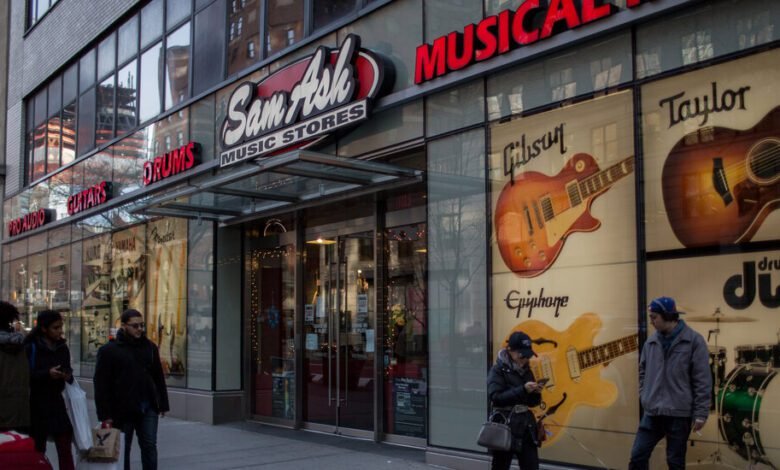Sam Ash Music Stores to close after 100 years in business

Sam Ash, the family-owned chain of music stores that provided guitars, drums and other instruments to countless budding and professional musicians, is closing all of its stores after 100 years in business, it announced this week.
Derek Ash, whose great-grandparents, Sam and Rose Ash, opened the first Sam Ash store in Brooklyn’s Brownsville neighborhood in 1924, said the company’s 42 stores couldn’t compete in the age of online shopping.
In March, Sam Ash announced it was closing 18 locations, hoping to buy the company time to survive, Ash said. But he said closing all the stores turned out to be a “necessity.”
“A lot of it was the shift to online shopping,” Ash, the company’s chief marketing officer, said in an interview. “There are so many options and maintaining a store with so much selection is very difficult.”
Sam Ash has stores in New York, New Jersey, Connecticut, Florida, North Carolina, Tennessee, Texas, California, Pennsylvania, Nevada and Ohio, Ash said. Some will close by the end of the month, he said. All will close at the end of July.
The news, announced by the company on Thursday, saddened many musicians who remembered buying instruments and gear at Sam Ash or just stopping by to try out guitars, amps or keyboards – a tactile, communal experience that can’t be replicated online .
Michael Whalen, a two-time Emmy-winning composer and artist who lives in Queens, remembers going to the Sam Ash store on West 48th Street in Manhattan, in what was known as Music Row, to buy synthesizers, recording equipment and studio speakers in the 1990s.
At that time, the area was filled with music stores like Manny’s Music, Rudy’s Music and Alex Musical Instruments, and Whalen could find another musician he knew. But those stores closed or moved. The Sam Ash store on West 48th Street was replaced more than a decade ago by another location on West 34th Street that is now also slated to close.
“Since the pandemic, you walk around town and you’re constantly talking about all these things that have closed,” Whalen said. “This feels like that kind of outcome. The city is changing a lot and many people accuse Manhattan of being a place only for the super rich. I can see that because the places that made it feel like a community are disappearing.”
Rock guitarist Steve Stevens, who once played with Billy Idol, remembers walking into a Sam Ash store in the Forest Hills neighborhood of Queens in 1983 and buying a black Kramer Pacer guitar for about $ 700. He played that guitar, he said, while recording the hit album Mr. Idol released later that year, “Rebel Yell.”
“I always felt like family at the W48th Street store,” he wrote on Facebook Friday. “The Ash family has been good to me over the years.”
The company has its roots in another era in New York. Sam Ash settled in the city after immigrating from Austria in 1907, when he was 10 years old, and worked in the clothing industry. He also played violin at weddings, dances and bar mitzvahs, and was determined to open his own music store. He and Ash pawned their engagement ring for $400 for a down payment on what would become Sam Ash’s first store, according to the company’s website. She later retrieved the ring.
Over the decades, Sam Ash has employed many musicians, giving them a steady paycheck as they strive to play shows.
Luis Infantas, manager of the West 34th Street store and drummer for a post-punk band called Black Rose Burning, said customers can always count on “real, music-quality advice and equipment.”
“That’s the one thing that sets us apart from the competition,” he said.
But sometimes, he said, customers would come to the store just to try out an instrument they researched online. Then they would go home and buy the instrument online.
Infantas, who has worked for Sam Ash for 29 years, said this practice, known as “showrooming,” highlights how difficult it was for traditional stores to compete with online giants like Amazon.
Still, working at Sam Ash was “the next best thing to being on stage,” Infantas said, “because you were close to the equipment you love, close to musicians, and you listened to music while you worked.”
Customers never knew who might walk through the door.
Once, on a Tuesday night, Infantas said, he sold monitors and keyboards to Stevie Wonder, who was buying them for a performance at the Obama White House. Another time, he said, James Gandolfini stopped by to buy drums for his son.
“Things like that you can’t experience,” he said, “unless you’re in an institution like Sam Ash.”




